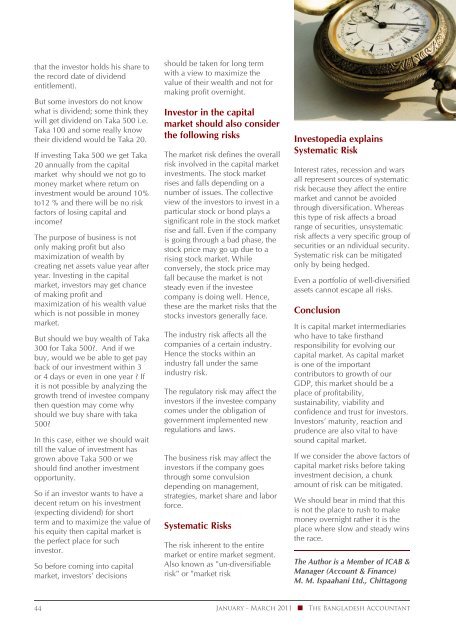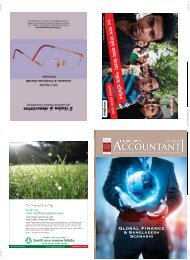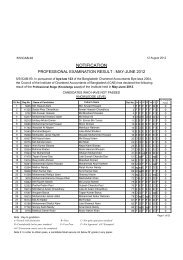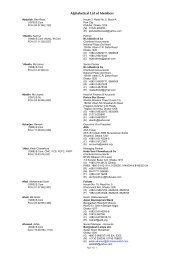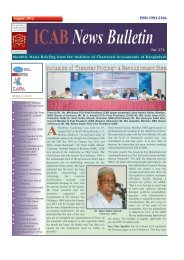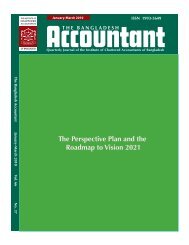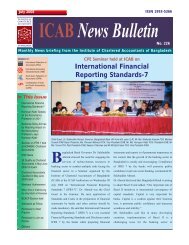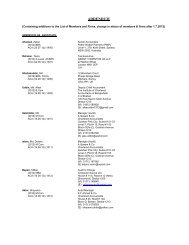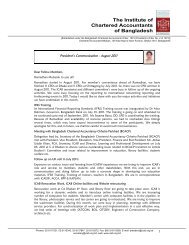Forma # 1.ai - ICAB
Forma # 1.ai - ICAB
Forma # 1.ai - ICAB
You also want an ePaper? Increase the reach of your titles
YUMPU automatically turns print PDFs into web optimized ePapers that Google loves.
that the investor holds his share to<br />
the record date of dividend<br />
entitlement).<br />
But some investors do not know<br />
what is dividend; some think they<br />
will get dividend on Taka 500 i.e.<br />
Taka 100 and some really know<br />
their dividend would be Taka 20.<br />
If investing Taka 500 we get Taka<br />
20 annually from the capital<br />
market why should we not go to<br />
money market where return on<br />
investment would be around 10%<br />
to12 % and there will be no risk<br />
factors of losing capital and<br />
income?<br />
The purpose of business is not<br />
only making profit but also<br />
maximization of wealth by<br />
creating net assets value year after<br />
year. Investing in the capital<br />
market, investors may get chance<br />
of making profit and<br />
maximization of his wealth value<br />
which is not possible in money<br />
market.<br />
But should we buy wealth of Taka<br />
300 for Taka 500?. And if we<br />
buy, would we be able to get pay<br />
back of our investment within 3<br />
or 4 days or even in one year ? If<br />
it is not possible by analyzing the<br />
growth trend of investee company<br />
then question may come why<br />
should we buy share with taka<br />
500?<br />
In this case, either we should wait<br />
till the value of investment has<br />
grown above Taka 500 or we<br />
should find another investment<br />
opportunity.<br />
So if an investor wants to have a<br />
decent return on his investment<br />
(expecting dividend) for short<br />
term and to maximize the value of<br />
his equity then capital market is<br />
the perfect place for such<br />
investor.<br />
So before coming into capital<br />
market, investors’ decisions<br />
should be taken for long term<br />
with a view to maximize the<br />
value of their wealth and not for<br />
making profit overnight.<br />
Investor in the capital<br />
market should also consider<br />
the following risks<br />
The market risk defines the overall<br />
risk involved in the capital market<br />
investments. The stock market<br />
rises and falls depending on a<br />
number of issues. The collective<br />
view of the investors to invest in a<br />
particular stock or bond plays a<br />
significant role in the stock market<br />
rise and fall. Even if the company<br />
is going through a bad phase, the<br />
stock price may go up due to a<br />
rising stock market. While<br />
conversely, the stock price may<br />
fall because the market is not<br />
steady even if the investee<br />
company is doing well. Hence,<br />
these are the market risks that the<br />
stocks investors generally face.<br />
The industry risk affects all the<br />
companies of a certain industry.<br />
Hence the stocks within an<br />
industry fall under the same<br />
industry risk.<br />
The regulatory risk may affect the<br />
investors if the investee company<br />
comes under the obligation of<br />
government implemented new<br />
regulations and laws.<br />
The business risk may affect the<br />
investors if the company goes<br />
through some convulsion<br />
depending on management,<br />
strategies, market share and labor<br />
force.<br />
Systematic Risks<br />
The risk inherent to the entire<br />
market or entire market segment.<br />
Also known as "un-diversifiable<br />
risk" or "market risk<br />
Investopedia explains<br />
Systematic Risk<br />
Interest rates, recession and wars<br />
all represent sources of systematic<br />
risk because they affect the entire<br />
market and cannot be avoided<br />
through diversification. Whereas<br />
this type of risk affects a broad<br />
range of securities, unsystematic<br />
risk affects a very specific group of<br />
securities or an ndividual security.<br />
Systematic risk can be mitigated<br />
only by being hedged.<br />
Even a portfolio of well-diversified<br />
assets cannot escape all risks.<br />
Conclusion<br />
It is capital market intermediaries<br />
who have to take firsthand<br />
responsibility for evolving our<br />
capital market. As capital market<br />
is one of the important<br />
contributors to growth of our<br />
GDP, this market should be a<br />
place of profitability,<br />
sustainability, viability and<br />
confidence and trust for investors.<br />
Investors’ maturity, reaction and<br />
prudence are also vital to have<br />
sound capital market.<br />
If we consider the above factors of<br />
capital market risks before taking<br />
investment decision, a chunk<br />
amount of risk can be mitigated.<br />
We should bear in mind that this<br />
is not the place to rush to make<br />
money overnight rather it is the<br />
place where slow and steady wins<br />
the race.<br />
The Author is a Member of <strong>ICAB</strong> &<br />
Manager (Account & Finance)<br />
M. M. Ispaahani Ltd., Chittagong<br />
44<br />
January - March 2011<br />
The Bangladesh Accountant


